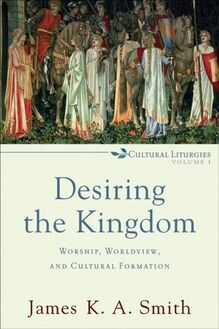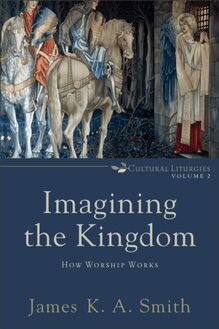Awaiting the King (Cultural Liturgies Book #3) , livre ebook
157
pages
English
Ebooks
2017
Vous pourrez modifier la taille du texte de cet ouvrage
Obtenez un accès à la bibliothèque pour le consulter en ligne En savoir plus
Découvre YouScribe en t'inscrivant gratuitement
Découvre YouScribe en t'inscrivant gratuitement
157
pages
English
Ebooks
2017
Vous pourrez modifier la taille du texte de cet ouvrage
Obtenez un accès à la bibliothèque pour le consulter en ligne En savoir plus
Publié par
Date de parution
07 novembre 2017
Nombre de lectures
3
EAN13
9781493406609
Langue
English
Poids de l'ouvrage
4 Mo
Publié par
Date de parution
07 novembre 2017
Nombre de lectures
3
EAN13
9781493406609
Langue
English
Poids de l'ouvrage
4 Mo
Cover
Title Page
Copyright Page
© 2017 by James K. A. Smith
Published by Baker Academic
a division of Baker Publishing Group
PO Box 6287, Grand Rapids, MI 49516-6287
www. bakeracademic.com
Ebook edition created 2017
All rights reserved. No part of this publication may be reproduced, stored in a retrieval system, or transmitted in any form or by any means—for example, electronic, photocopy, recording—without the prior written permission of the publisher. The only exception is brief quotations in printed reviews.
Library of Congress Control Number: 2017028470
ISBN 978-1-4934-0660-9
Unless otherwise indicated, Scripture quotations are from the Holy Bible, New International Version®. NIV®. Copyright © 1973, 1978, 1984, 2011 by Biblica, Inc.™ Used by permission of Zondervan. All rights reserved worldwide. www.zondervan.com
Scripture quotations labeled ESV are from The Holy Bible, English Standard Version® (ESV®), copyright © 2001 by Crossway, a publishing ministry of Good News Publishers. Used by permission. All rights reserved. ESV Text Edition: 2011
Scripture quotations labeled KJV are from the King James Version of the Bible.
Quotations from Oliver O’Donovan, The Desire of the Nations , 1996, © Cambridge University Press 1996, reproduced with permission.
Endorsements
“With great clarity and cultural insight, Smith sets out an Augustinian-Reformed antidote to the highly polarized forms of politics we see around us today, in which churches—whether on the left or the right—are too often raucous and rancorous participants. In doing so, he joins a growing chorus of those arguing for a constructive theological account of the politics of a common life.”
— Luke Bretherton , Kenan Institute for Ethics, Duke Divinity School
“ Awaiting the King presents Smith’s mature public theology—a carefully nuanced plea for ‘calculated ambivalence’ and ‘cultivated circumspection’ toward culture. It is a vision of resident aliens invested in the world around them. Lucid and persuasive as always, Smith challenges the ways in which contemporary Christians—including his own Neocalvinist tradition—run the risk of naturalizing shalom. Smith’s account unabashedly advocates making life’s final, heavenly end the starting point for the way we structure our social life together. This final, crowning volume of the Cultural Liturgies project has the potential to profoundly redirect contemporary public theology and practice.”
— Hans Boersma , Regent College
“Smith’s Awaiting the King is a thoughtful, wise, and provocative book. In it, we are challenged to recognize certain truths that run counter to the Western tradition: that the state is deeply religious, being as it is an incubator of love-shaping practices; that the church is profoundly political, being as it is a place of public ritual centered on and led by a King; and that the church’s public theology must therefore resituate the political in light of creation and reframe it in light of eternity. Awaiting the King is not only smart but also well written and relevant to a broad range of interests, including public theology, political science, philosophy, and social ethics.”
— Bruce Riley Ashford , Southeastern Baptist Theological Seminary
Dedication
For our friends at Cardus and the team at Comment , in partnership for the renewal of North American social architecture
Epigraphs
Joseph of Arimathea, a prominent member of the Council, who was himself waiting for the kingdom of God, went boldly to Pilate and asked for Jesus’ body.
Mark 15:43
Theology must be political if it is to be evangelical. Rule out the political questions and you cut short the proclamation of God’s saving power; you leave people enslaved where they ought to be set free from sin—their own sin and others’.
Oliver O’Donovan, The Desire of the Nations
So long as the Church preaches the gospel and functions as a properly “political” reality, a polity of her own, the kings of the earth have a problem on their hands. . . . As soon as the church appears, it becomes clear to any alert politician that worldly politics is no longer the only game in town. The introduction of the church into any city means that the city has a challenger within its walls.
Peter Leithart, Against Christianity
[Political theology] has, in the first place, pastoral importance: to give guidance to those who, believing the Christian faith or capable of suspending their unbelief, have to exercise political responsibilities. Nothing very specialized need be envisaged here; we need not confine political ethics to the mirror-for-princes mold, as a professional science of politicians or civil servants. The responsibilities are those which we all face, regardless of our views on political institutions and the propriety of taking a leading role in them. . . . Hermit and politician both have to make up their minds as to whether they can acknowledge the institutions that claim to serve them.
Oliver O’Donovan, The Ways of Judgment
Fear is not a Christian habit of mind.
Marilynne Robinson, The Givenness of Things
Contents
Cover i
Title Page ii
Copyright Page iii
Endorsements iv
Dedication v
Epigraphs vi
List of Sidebars ix
Preface xi
Acknowledgments xv
Introduction: Liturgical Politics: Reforming Public Theology 1
A Parable for Public Life: The Postman
Public Theology in a Liturgical Mode
A Liturgical Lens on the Political
1. Rites Talk: The Worship of Democracy 19
Blurring the (Pen)Ultimate Distinction
The Ultimate Bleeds into the Penultimate
Democracy, Tradition, and Liturgy
On (Mis)Understanding the “Earthly City”
Augustine’s Political Phenomenology
2. Revisiting the Church as Polis : Cultivating an Ecclesial Center of Gravity 53
Worship as an Irruption in and for the World
The Desire of the Nations
The Reign of God
Jesus Is King
Naturalizing Shalom: The Temptations of a Kuyperian Secularism
3. The Craters of the Gospel: Liberalism’s Borrowed Capital 91
Unacknowledged Legislation
The Ecclesial Roots of Democratic Liberalism
Excursus: Common Grace versus Providence
Against Idealism: Social Reform as If History Matters
4. The Limits and Possibility of Pluralism: Reforming Reformed Public Theology 131
The Challenge of Pluralism
Accounting for Pluralism
Chaplin’s “Christian Diversity State”
Naturalizing the State: Sphere Sovereignty as Macroliberalism?
Practicing Pluralism: Reforming Reformed Social Thought
5. Redeeming Christendom: Or, What’s Wrong with Natural Law? 151
Rethinking Nature and Grace, Creation and Resurrection
Rethinking the “Secular,” Redeeming Christendom
6. Contested Formations: Our “Godfather” Problem 165
Concurrent Formation and the Dynamics of Deformation: Case Studies
Analyzing Ecclesial Failure
Ecclesiology and Ethnography
Accounting for Disordered Loves
Conclusion: The City of God and the City We’re In: Augustinian Principles for Public Participation 209
Two Cheers for Heaven: A Report from a Century of “Transforming Culture”
Cultivating Circumspection: Building an Ecclesial Center of Gravity
Calculated Ambivalence: Four Principles of Ad Hoc Collaboration
In Praise of the Quixotic
Name Index 225
Subject Index 231
Back Cover 234
Sidebars
Picturing This
Picturing Political Liturgies: Opening Exercises 1
Picturing “Fabulous” Theologies: Visiting the Stadium with David Foster Wallace 23
Picturing Political History Otherwise: Hidden Figures 68
Picturing Resistance in Cormac McCarthy’s The Road 73
Picturing Political Genealogy: Finding Your Roots 98
Picturing the Law in Les Misérables : Two Cheers for Javert 112
Picturing Competing Formations in The Godfather 165
Picturing Liturgical Capture in The Mission 179
Picturing Conflictedness: Identity in the Colonies 192
Picturing Political Discipleship: Epistles to a Governor 197
Picturing Engagement in Graham Greene’s Quiet American 210
To Think About
Renewing Social Architecture 15
A Stance for the Journey 49
The Unveiling of a King 57
The Lectionary as Political Drama 61
The Saeculum as Pregnant Widow 77
The Christian Year as the Life of the King 80
Mercy in Judgment 107
The Future of Christianity in Updike’s Manhattan 145
Learning to Live in the Saeculum at Gate A12 161
Stand There and Take It 185
Preface
If this book has taken much longer than I ever would have anticipated, that’s because it’s a very different book from the one I envisioned when Desiring the Kingdom was published in 2009. At that time, I imagined the projected third volume of the Cultural Liturgies project as something like “Hauerwas for Kuyperians,” a come-to-Yoder altar call for all those who were so enthusiastic about “transforming” culture and affirming common grace. My primary concern was to revivify what in the Reformed tradition we call the “antithetical” side of the tradition—the critical, prophetic impetus that says “No!” to cultural assimilation and political injustice (a voice one can hear most clearly in Richard Mouw’s books from the early 1970s). In my experience, the affirmative “common grace” side of the tradition had been enlisted to say “Yes!” to culture in ways that simply baptized the status quo. Under the banner of “transforming” culture, we marched straight into our own assimilation.
However, as my questions continued to percolate, some of my assumptions and analyses began to shift underfoot. I can particularly recall a conversation with my friend Hans Boersma that lodged a question I couldn’t quite shake. That question, in turn, propelled me toward two concurrent immersions over the past five years: an ongoing engagement with Augustine’s City of God and serious interaction with the corpus of Oliver O’Donovan. Both occasioned serious rethinking that took me back to the core convictions behind Desiring the Kingdom but then helped me to plot a different path to volume 3. As a result, one of my new hopes for this book is diaconal: I have tried to come alongside the seminal work of Augustine and O’Donovan as


